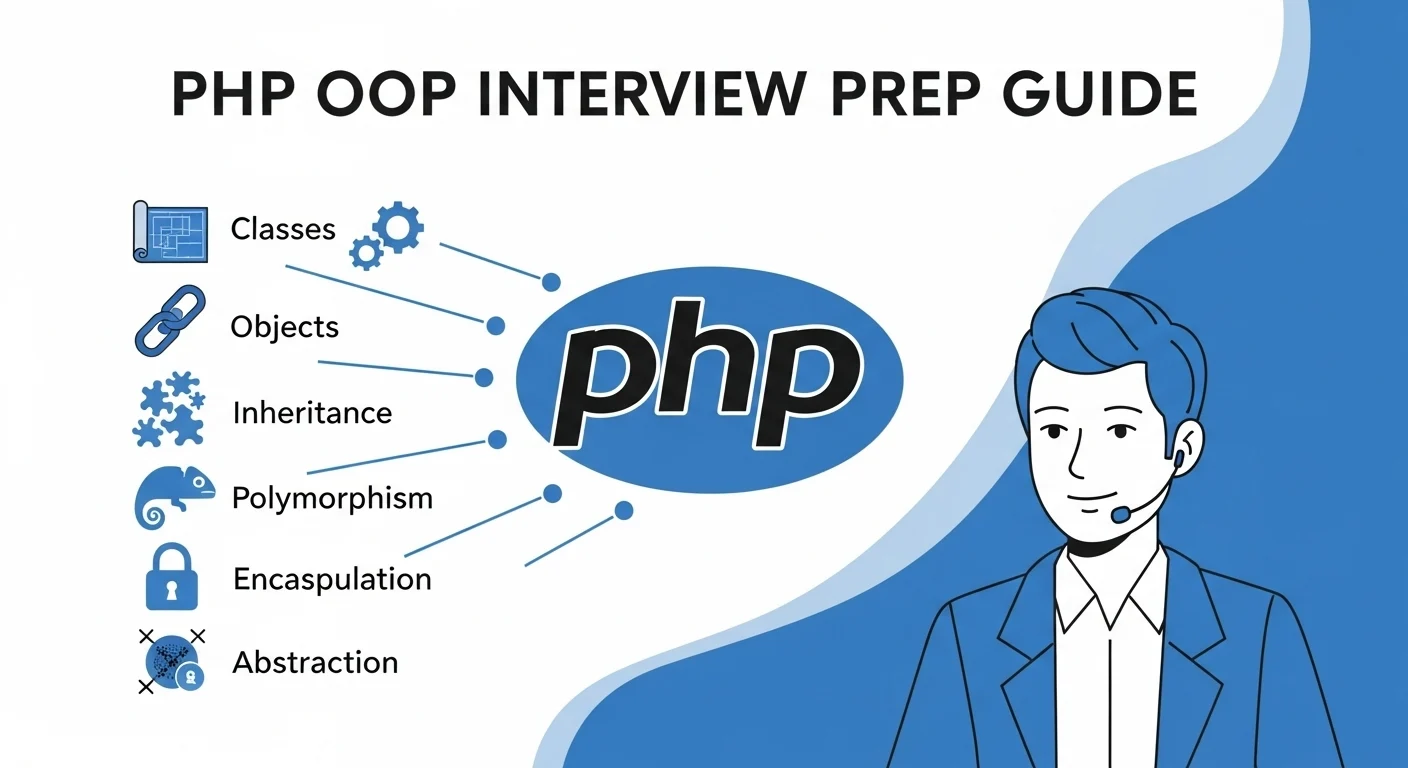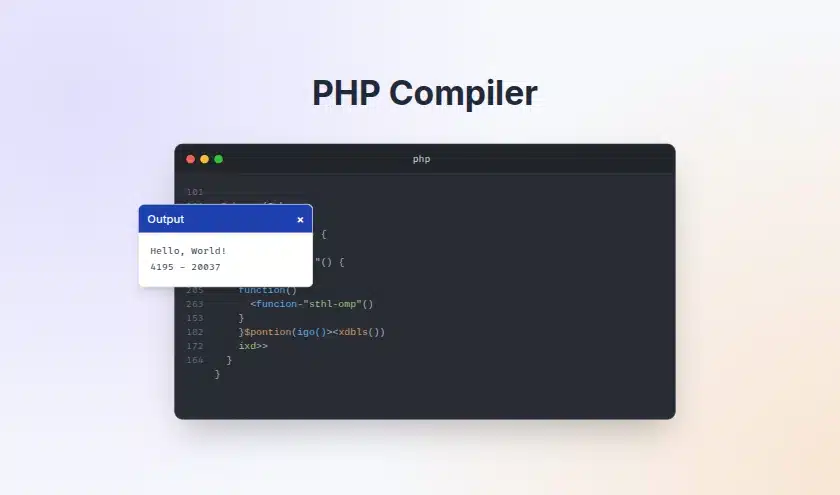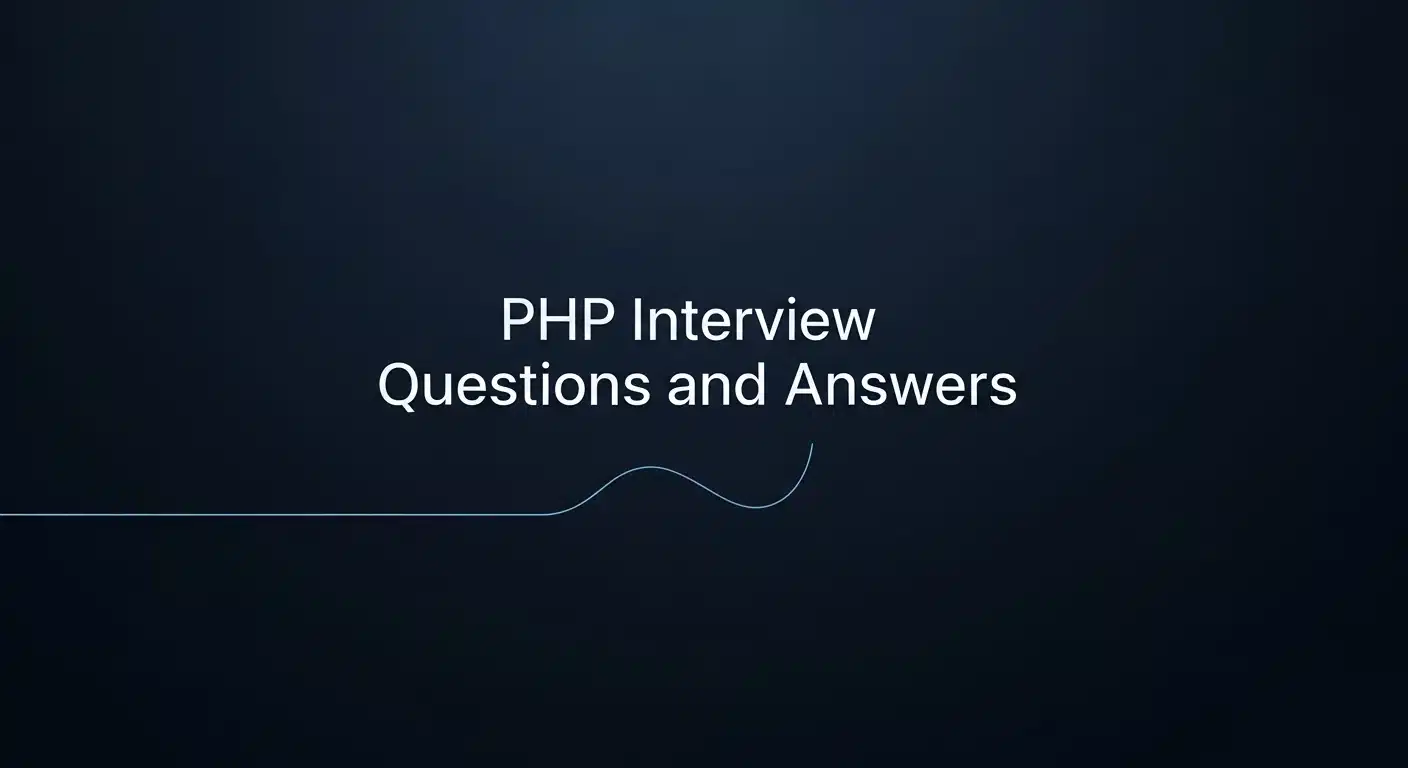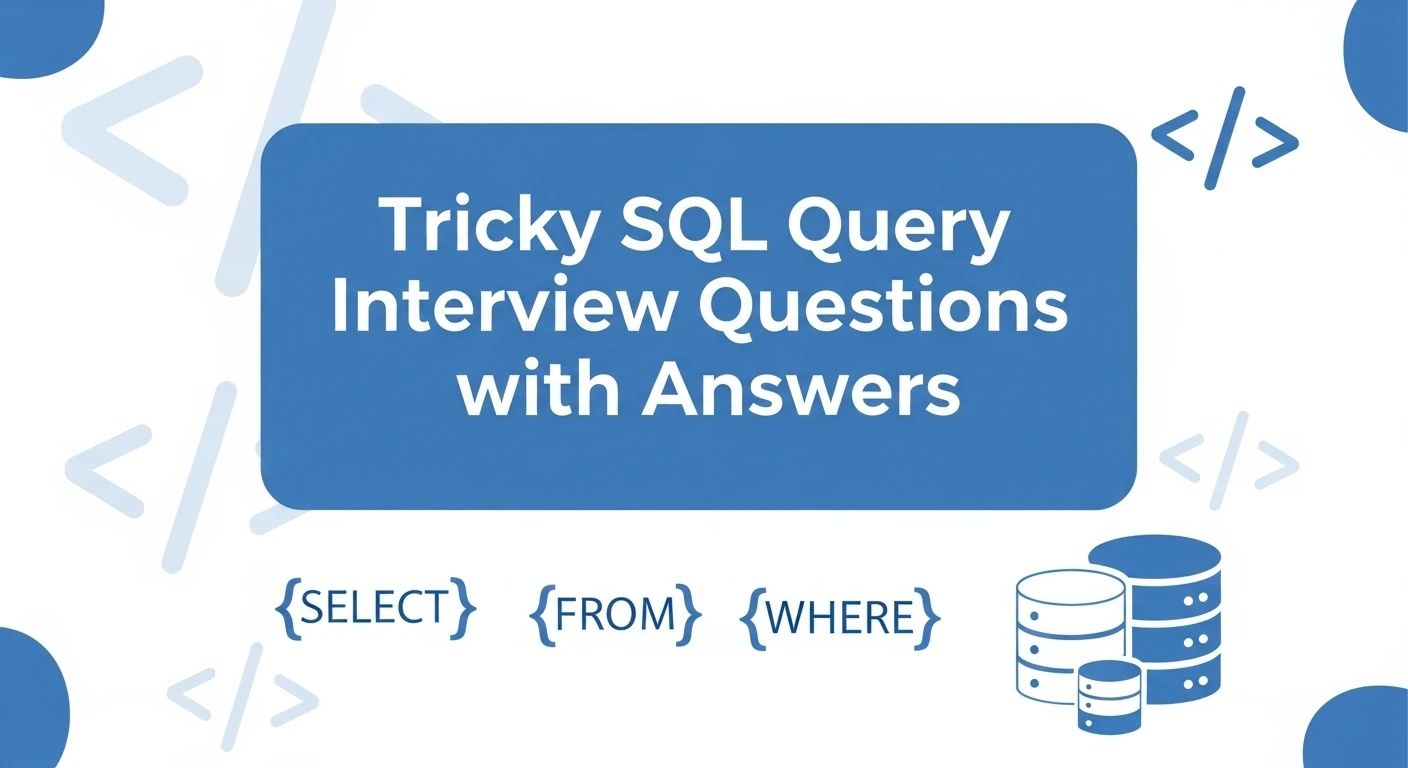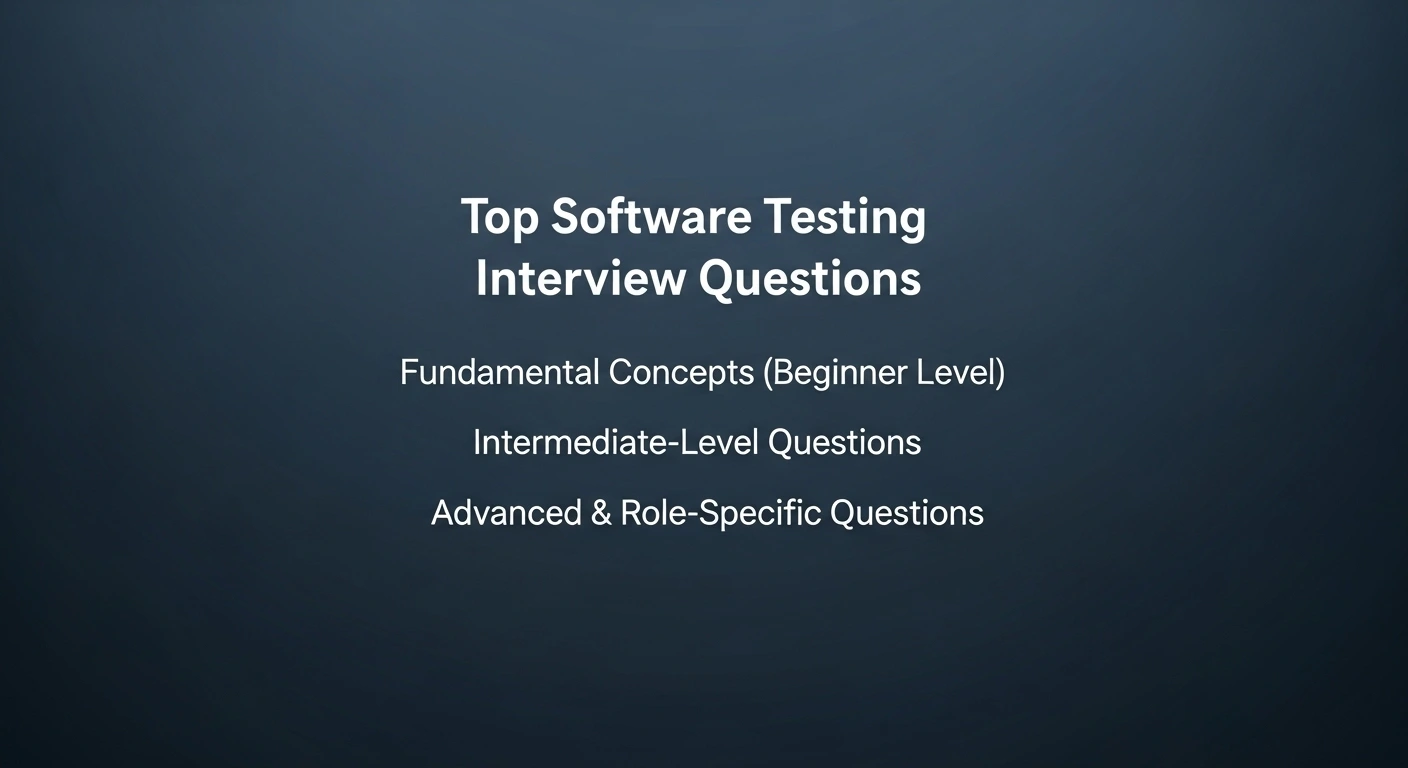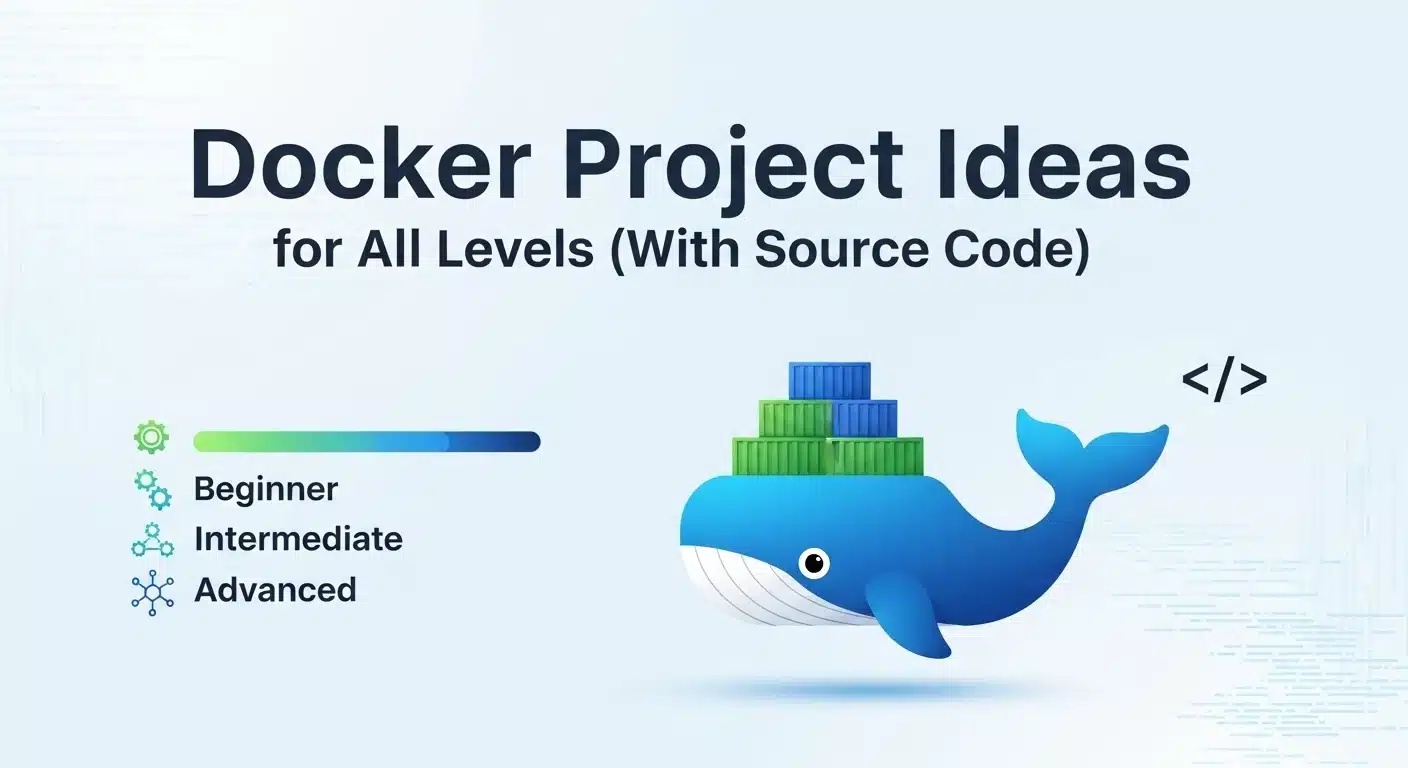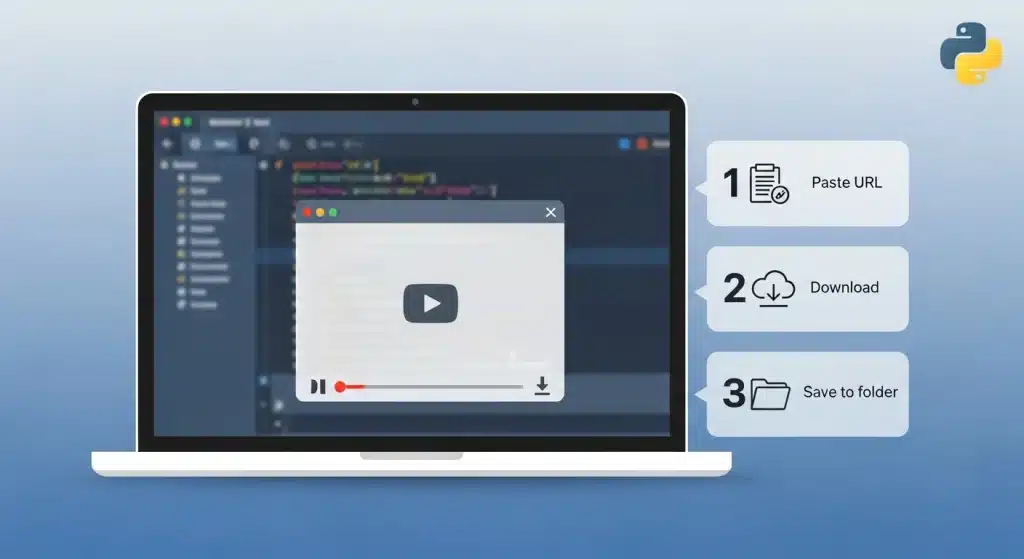Object-Oriented Programming (OOP) in PHP is a way of writing code in which we keep data and its functions in one place, inside objects. This method is very useful when the project is big, because understanding and managing the code becomes easy.
Nowadays, every good PHP job checks OOP knowledge. It is not enough to just know basic coding. Companies want to see whether you will be able to write clean and reusable code in real-life projects or not.
So if you want to become a PHP developer, you must be well-versed in basic OOP concepts such as classes, objects, inheritance, polymorphism, encapsulation, and abstraction. This guide contains 33+ PHP OOP interview questions that will prepare you from beginner to advanced level.
Enroll in our free PHP course to learn how to code with this popular server-side scripting language. Learn PHP basics like variables, data types, control statements, loops, and functions through hands-on implementations.
Basic OOP Concept Questions
1. What is Object-Oriented Programming (OOP)?
Answer: OOP is a way to write code. It uses "objects" to store data and functions together. The main ideas are encapsulation, inheritance, polymorphism, and abstraction.
2. What are the four main pillars of OOP?
Answer:
- Encapsulation: Put data and functions together. Control who can use them.
- Inheritance: Make new classes from old classes.
- Polymorphism: Same name, different actions.
- Abstraction: Hide hard parts. Show only simple parts.
3. What is a class in PHP?
Answer: A class is like a plan. It tells how to make objects. It has properties (data) and methods (functions).
class Car {
public $color;
private $engine;
public function start() {
return "Car started";
}
}
4. What is an object in PHP?
Answer: An object is made from a class. You use the new word to make it. It holds real data.
$myCar = new Car();
$myCar->color = "red";
5. What are the different visibility levels in PHP?
Answer:
- public: Everyone can see and use it.
- private: Only the same class can use it.
- protected: The class and its children can use it.
6. What is the difference between $this and self?
Answer:
$thispoints to the current object.selfpoints to the current class. Use it for static things.
7. What is a constructor in PHP?
Answer: A constructor runs when you make a new object. It uses __construct(). You can set up the object here.
class User {
private $name;
public function __construct($name) {
$this->name = $name;
}
}
8. What is a destructor in PHP?
Answer: A destructor runs when an object is deleted. It uses __destruct(). You can clean up things here.
class Database {
public function __destruct() {
// Clean up database connection
}
}
9. What is method overloading in PHP?
Answer: PHP does not have real method overloading. But you can fake it. Use __call() method or default parameters.
10. What are static methods and properties?
Answer: Static things belong to the class. They do not belong to objects. Use :: to access them.
class MathHelper {
public static $pi = 3.14159;
public static function add($a, $b) {
return $a + $b;
}
}
echo MathHelper::$pi;
echo MathHelper::add(5, 3);
Intermediate Concept Questions
11. What is inheritance in PHP?
Answer: Inheritance lets a class get things from another class. Use the extends word.
class Animal {
protected $name;
public function eat() {
return "Eating...";
}
}
class Dog extends Animal {
public function bark() {
return "Woof!";
}
}
12. What is method overriding?
Answer: Method overriding happens when a child class makes a new version of a parent method.
class Shape {
public function area() {
return 0;
}
}
class Circle extends Shape {
private $radius;
public function area() {
return 3.14 * $this->radius * $this->radius;
}
}
13. What is an abstract class?
Answer: An abstract class cannot make objects. It may have abstract methods. Child classes must make these methods.
abstract class Vehicle {
abstract public function start();
public function stop() {
return "Vehicle stopped";
}
}
class Car extends Vehicle {
public function start() {
return "Car started";
}
}
14. What is an interface in PHP?
Answer: An interface is like a contract. It tells what methods a class must have. All methods are public and abstract.
interface Drawable {
public function draw();
}
class Circle implements Drawable {
public function draw() {
return "Drawing a circle";
}
}
15. What's the difference between abstract classes and interfaces?
Answer:
- Abstract classes: Can have real methods and abstract methods. Can have properties and constructors.
- Interfaces: Only method names. All methods are public and abstract.
- Inheritance: Class
extendsone abstract class. Classimplementsmany interfaces.
16. What is polymorphism in PHP?
Answer: Polymorphism means different objects can act the same way. They use the same method names but do different things.
interface Animal {
public function makeSound();
}
class Dog implements Animal {
public function makeSound() { return "Woof!"; }
}
class Cat implements Animal {
public function makeSound() { return "Meow!"; }
}
function animalSound(Animal $animal) {
return $animal->makeSound();
}
17. What are traits in PHP?
Answer: Traits help you reuse code. You can put the same methods in many classes.
trait Logger {
public function log($message) {
echo "Log: " . $message;
}
}
class User {
use Logger;
}
class Order {
use Logger;
}
18. What is encapsulation?
Answer: Encapsulation means hiding inside details. Only show what others need to use. Use public methods to control access.
19. What is composition vs inheritance?
Answer:
- Inheritance: "is-a" relationship. Dog is an Animal.
- Composition: "has-a" relationship. Car has an Engine.
class Engine {
public function start() { return "Engine started"; }
}
class Car {
private $engine;
public function __construct() {
$this->engine = new Engine();
}
}
20. What is the final keyword?
Answer: The final word stops things. Final class cannot be extended. Final method cannot be overridden.
final class Database {
// Cannot be extended
}
class Parent {
final public function importantMethod() {
// Cannot be overridden
}
}
Advanced Concept Questions
21. What are magic methods in PHP?
Answer: Magic methods are special methods. PHP calls them automatically in some situations. Common ones are:
__construct(),__destruct()__get(),__set()__call(),__callStatic()__toString(),__clone()
22. What is the __autoload() function?
Answer: __autoload() was used to load class files automatically. It is old now. Modern PHP uses spl_autoload_register().
spl_autoload_register(function ($className) {
include $className . '.php';
});
23. What is method chaining?
Answer: Method chaining lets you call many methods on one object. Each method returns $this. You can write them in one line.
class QueryBuilder {
private $query = '';
public function select($fields) {
$this->query .= "SELECT $fields ";
return $this;
}
public function from($table) {
$this->query .= "FROM $table ";
return $this;
}
}
$query = (new QueryBuilder())
->select('*')
->from('users');
24. What is the Singleton pattern?
Answer: Singleton makes sure only one object exists. You cannot make more than one.
class Database {
private static $instance = null;
private function __construct() {}
public static function getInstance() {
if (self::$instance === null) {
self::$instance = new self();
}
return self::$instance;
}
}
25. What is dependency injection?
Answer: Dependency injection gives a class what it needs from outside. The class does not make its own dependencies.
class EmailService {
private $mailer;
public function __construct(MailerInterface $mailer) {
$this->mailer = $mailer;
}
}
26. What is the difference between == and === when comparing objects?
Answer:
==compares what is inside objects (properties).===compares if objects are exactly the same (same instance).
27. What is object cloning in PHP?
Answer: Object cloning makes a copy of an object. Use the clone word. You can customize copying with __clone().
class User {
public $name;
public function __clone() {
// Custom cloning logic
}
}
$user1 = new User();
$user2 = clone $user1;
28. What is late static binding?
Answer: Late static binding helps with inheritance. Use static:: instead of self::. It points to the class that was called.
class A {
public static function who() {
echo __CLASS__;
}
public static function test() {
static::who(); // Late static binding
}
}
class B extends A {
public static function who() {
echo __CLASS__;
}
}
B::test(); // Outputs: B
29. What are anonymous classes in PHP?
Answer: Anonymous classes are classes without names. They are good for one-time use.
$logger = new class {
public function log($message) {
echo $message;
}
};
30. What is the Factory pattern?
Answer: Factory pattern makes objects. You do not need to know the exact class names.
class ShapeFactory {
public static function create($type) {
switch($type) {
case 'circle': return new Circle();
case 'square': return new Square();
}
}
}
31. What is the Observer pattern?
Answer: Observer pattern connects objects. When one object changes, it tells all other objects.
interface Observer {
public function update($data);
}
class Subject {
private $observers = [];
public function attach(Observer $observer) {
$this->observers[] = $observer;
}
public function notify($data) {
foreach($this->observers as $observer) {
$observer->update($data);
}
}
}
32. What is namespace in PHP?
Answer: Namespaces prevent name problems. They group classes, functions, and constants together.
namespace App\Models;
class User {
// User class in App\Models namespace
}
$user = new \App\Models\User();
33. What is the instanceof operator?
Answer: instanceof checks if an object is from a specific class or implements an interface.
if ($object instanceof User) {
// $object is a User instance
}
34. What is reflection in PHP?
Answer: Reflection lets you look at and change classes, methods, and properties while the program runs.
$reflection = new ReflectionClass('User');
$methods = $reflection->getMethods();
35. What are generators in PHP OOP context?
Answer: Generators are special functions. They can stop and start again. Good for big data sets. Saves memory.
class DataProcessor {
public function processLargeDataset() {
for ($i = 0; $i < 1000000; $i++) {
yield $this->processItem($i);
}
}
}
36. What is the difference between composition and aggregation?
Answer:
- Composition: Strong "has-a" relationship. If Car dies, Engine dies too.
- Aggregation: Weak "has-a" relationship. If Department dies, Employees still live.
37. What are PHP 8 OOP features?
Answer:
- Constructor property promotion (shorter way to set properties)
- Union types (property can be multiple types)
- Match expressions (better switch)
- Named arguments (call functions with parameter names)
- Attributes (like annotations)
class User {
public function __construct(
public string $name,
public int $age
) {}
}
Best Practices & Tips
Key OOP Best Practices:
- SOLID Principles: Single Responsibility, Open/Closed, Liskov Substitution, Interface Segregation, Dependency Inversion
- Use composition more than inheritance
- Program to interfaces, not implementations
- Use clear class and method names
- Keep classes focused and simple
- Keep classes separate from each other
Common Interview Problems:
- Know the difference between
self::,static::, andparent:: - Know when to use abstract classes vs interfaces
- Understand object lifecycle and memory management
- Be able to make common design patterns
- Understand autoloading and namespaces
This guide covers all important PHP OOP concepts. These questions are common in interviews. The guide goes from basic ideas to advanced patterns and new PHP features.
Also Read:
